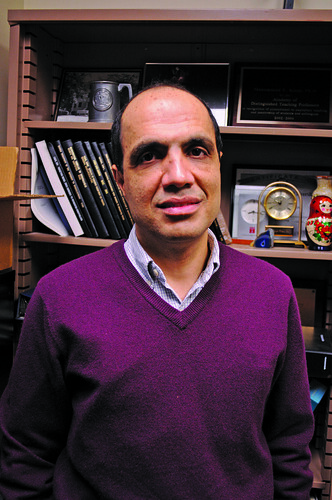While Wikipedia may tempt students as a legitimate resource, it presents a problem in actual research.

Controversy has hovered around Wikipedia since its inception and has split professors and students on the debate of whether it should be recognized as a reliable source.
Not surprisingly, of the five professors asked if Wikipedia should become a reliable source, all of them opposed (one professor even said Wikipedia was strictly prohibited on their syllabus).
“My view of Wikipedia is that it is useful but not always reliable,” said Mohammad Kiani, the chair and a professor of the mechanical engineering department.
“My goal in my classes is to get the students familiarized with primary and/or secondary sources of information. The issue of access to information is much more complicated than just Wikipedia. The bigger issue is the notion by many that information and knowledge are one and the same thing.”
Of the 27 students asked if Wikipedia should be considered a credible source 15 said they felt it should be, while 12 didn’t.
“I personally use Wikipedia quite often, but I try and keep the information I get from it as inspiration for more things to research,” sophomore film and media arts major Chris Jewell said. “I don’t think that a Wikipedia article should be allowed for use in academic papers. There is no way to verify the legitimacy of all of the articles, and so it cannot always be counted as reliable. Many well-written wikis include the sources of information at the bottom though, so sometimes I’ll cite those.”
However, some students are pro-Wikipedia.
“Wikipedia is a reliable source of information because just like our papers and reports it includes a bibliography,” said freshman film and media arts major Will Hart. “When used properly it is a powerful tool for students.”
Professors usually despise Wikipedia mainly because the information found on the website has been plagiarized by students.
“The problem is that Wikipedia is usually the first link that comes up when anyone does an informational search on the Web, and there is a natural inclination to go there first,” history professor Francis Ryan said. “Even if we do that, my advice is always to verify the information from other more dependable sources.”
Unfortunately, not everyone does this. The information from the search engine is often copied, pasted and re-worded by students rather than using the information to support their own opinions.
It’s actions, such as these that give Wikipedia a bad reputation in schools because it becomes another outlet for the lackadaisical student.
“I tend not to rely on Wikipedia because while some of the articles are quite strong, there is a lack of oversight to claims that governs publicly-created databases,” humanities professor David Mitchell said. “I tell my students that they may start with Wikipedia as a springboard into a wider research undertaking, but always make sure they test out all claims as a critical part of the data gathering mission.”
For many students, a project that requires finding book sources from the library or library-based websites can be a huge ordeal. The Internet has left many spoiled and unable to thoroughly research topics without the help of a librarian or professor.
Natsai Todd can be reached at natsai.todd@temple.edu.


Be the first to comment